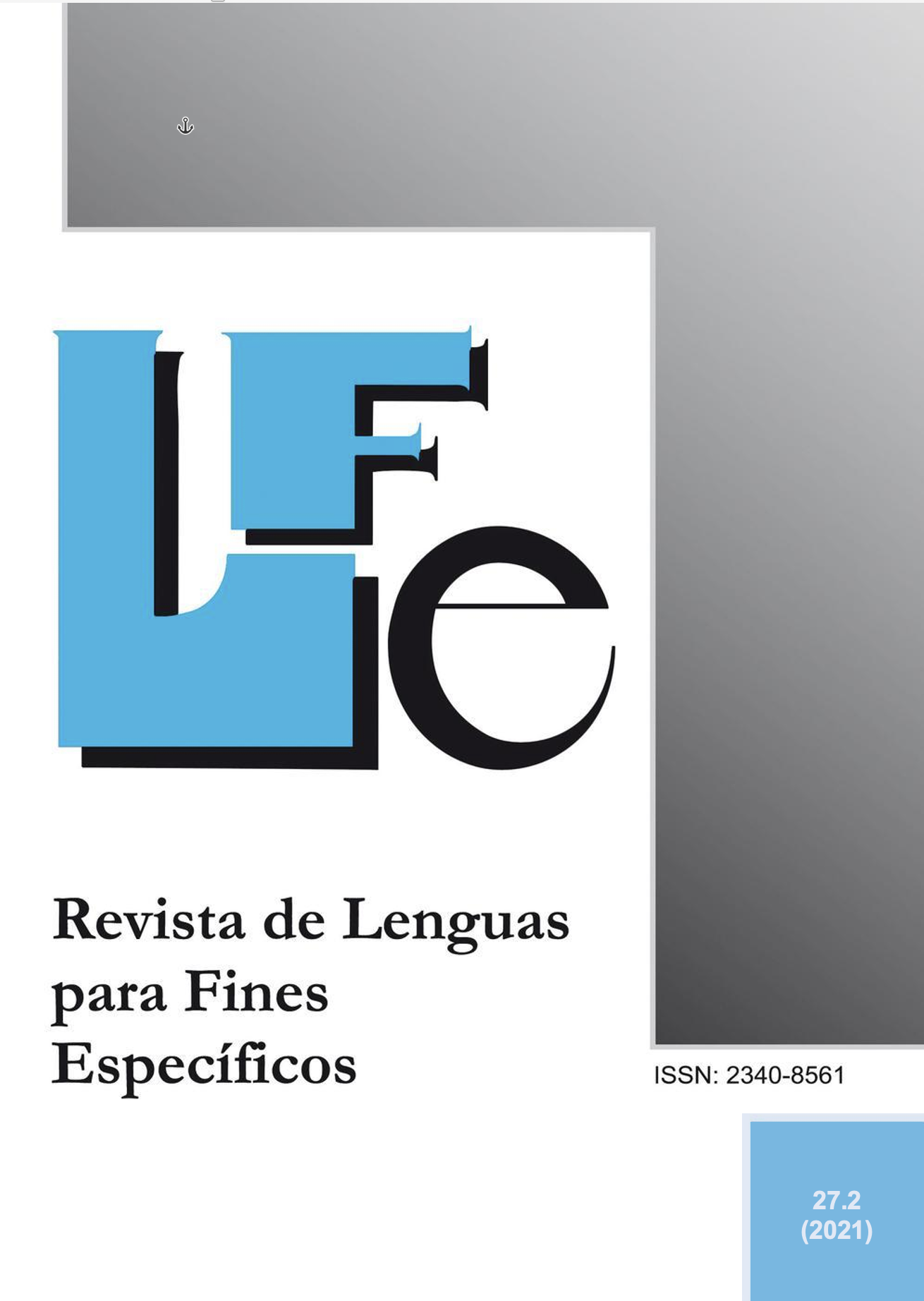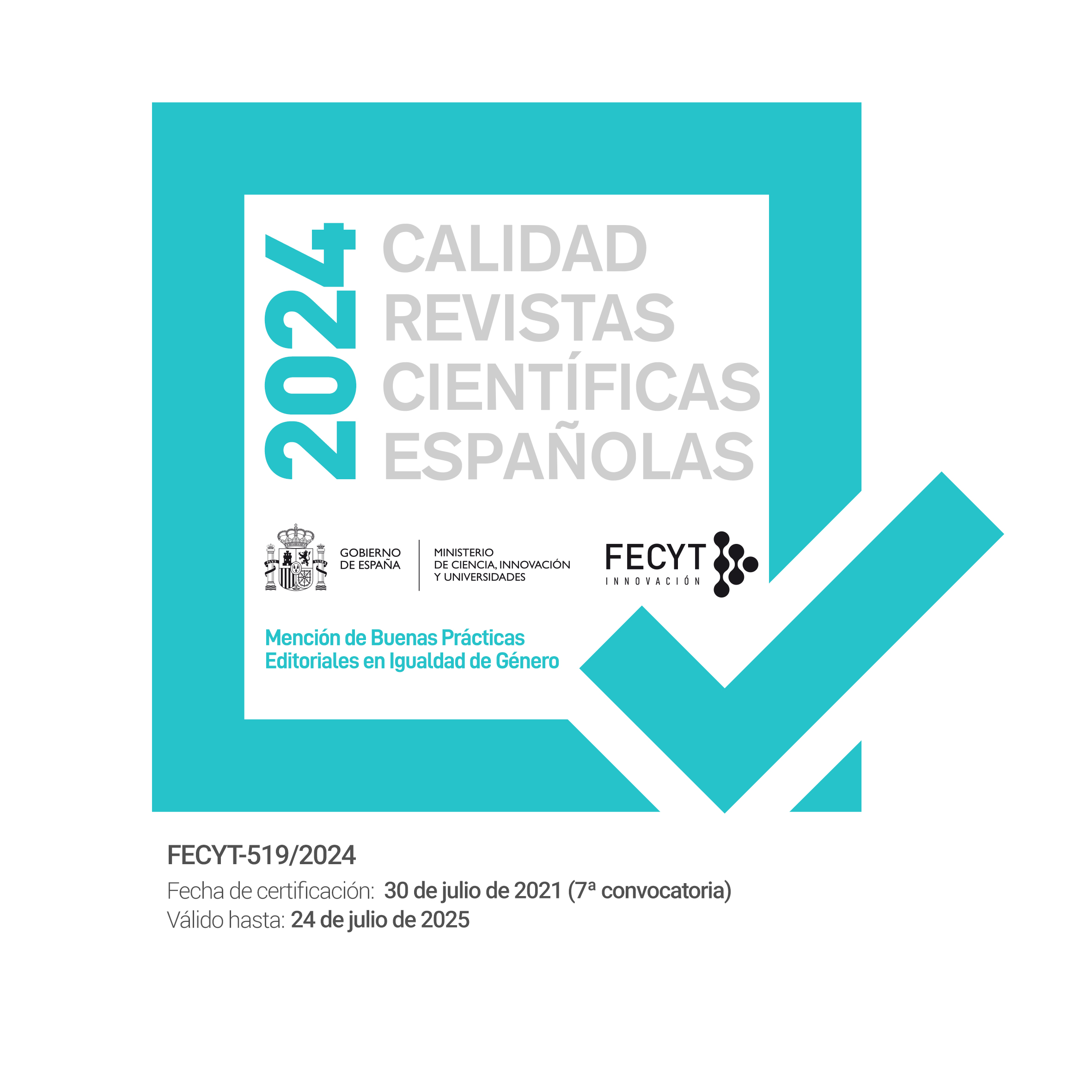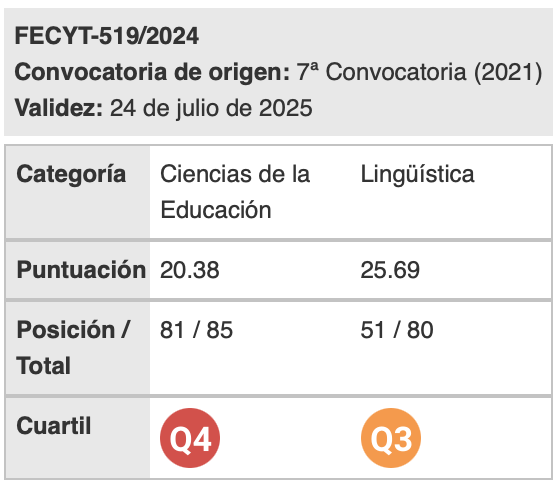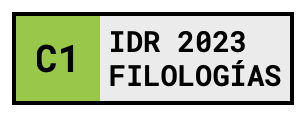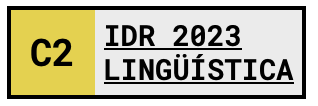Procesos de focalización en el registro científico en inglés moderno tardío
Palabras clave:
operadores focales, focalización, escalaridad, escalas pragmáticas, sociolingüística histórica, Lingüística de corpus, registro científico inglés, inglés moderno tardíoResumen
Las lenguas cuentan, entre otros, con diversos recursos para resaltar la información en el discurso. Según el principio del foco final (Quirk & Greenbaum, 1973; Downing & Locke, 2006), el último de los miembros de un enunciado es el más informativo. Este grado de informatividad puede ser también marcado a través de operadores focales. En este sentido, atendiendo a la perspectiva del receptor, varios estudios experimentales apuntan a la importancia de estos operadores como reguladores en el procesamiento de la información (Loureda et al. 2015; Nadal, Recio Fernández, Rudka, & Loureda 2017; Cruz & Loureda, 2019).
Existen estudios sobre estos operadores desde perspectivas más cercanas al emisor, ya sean descriptivas (König, 1991; Dimroth & Klein, 1996; Traugott 1996) o contrastivas (Bouma, Hendricks, & Hoeksema, 2007; Gast & van der Auwera, 2011; Gast, 2017). Desde la lingüística de corpus, se ha estudiado su uso en corpus generales (Gast, 2006, 2017; Traugott, 2006; Gast & Rzymski, 2015). Sin embargo, poco se ha investigado sobre ellos en corpus especializados. El objetivo de este trabajo es analizar el uso de distintos operadores focales (also, even, only, too, entre otros) en varios subcorpus del Coruña Corpus (Moskowich & Crespo García, 2007; Moskowich & Parapar López, 2008; Crespo García & Moskowich, 2010), un corpus especializado en el registro científico en inglés en el período moderno tardío. En particular se seleccionaron para este estudio los subcorpus de astronomía (CETA, Moskowich, Lareo, Camiña Rioboo, & Crespo, 2012), filosofía (CEPhiT, Moskowich, Camiña Rioboo, Lareo, & Crespo, 2016), historia (CHET, Moskowich, Lareo, Lojo Sandino, & Sánchez Barreiro, 2019) y ciencias de la vida (CELiST, Lareo, Monaco, Esteve-Ramos, & Moskowich, 2021). El carácter diacrónico del corpus, que cubre el período de consolidación del registro científico en inglés (siglos XVII y XIX) aporta una nueva dimensión aún no explorada en el estudio de los operadores focales. Igualmente, la orientación sociolingüística del corpus permite la inclusión de variables extralingüísticas (sexo y lugar de educación del autor(a), tipo de texto), que, unidas a un estudio lingüístico, han permitido extraer conclusiones sobre el uso de los operadores focales en el registro científico en inglés moderno tardío.
Descargas
Citas
Anderson, W. (1705). The history of France. From the commencement of the reign of Henry III and the riſe of the Catholic League; to the Peace of Vervins, and the establishment of the famous Edict of Nantes, in the reign of Henry IV. Together with the moſt intereſting events in the hiſtory of Europe, during that period. Londres: printed for the author.
Bancroft, E. (1769). An essay on the Natural History of Guiana, in South America. Containing a description of many curious productions in the animal and vegetable systems of that country. Together with an account of the religion, manners and customs of several tribes of its Indian inhabitants. Interspersed with a variety of literary and medical observations. In several letters from a Gentleman of the Medical Faculty during his residence in that country. Londres: printed for T. Becket and P. A. Hondt.
Bennett, G. (1862). The history of Bandon. Cork: Henry and Coghlan.
Bigland, J. (1810). The history of Spain, from the earliest period to the year 1809. In two volumes. Vol.1. Londres: printed for Longman, Hurst, Rees, and Ormd.
Hardiman, J. (1820). The history of the town and county of the town of Galway, from the earliest period to the present time. Embellished with several engravings. To which is added a copious appendix, containing the principal charters and other original documents. Dublin: printed by W. Folds and sons.
Hooke, N. (1745). The Roman History, from the building of Rome to the ruin of the Commonwealth. Illustrated with Maps and other Plates. Vol. II. Book IV. Londres: printed by James Bettenham.
Justice, E. (1739). A voyage to Russia: describing the laws, manners, and cuſtoms, of that great Empire, as govern'd, at this preſent, by that excellent Princeſs, the Czarina. Shewing the beauty of her Palace, the grandeur of her courtiers, the forms of building at Petersburgh, and other places: with ſeveral entertaining adventures, that happened in the paſſage by sea, and land. York: printed by Thomas Gent.
Masson. D. (1855). Medieval History. Londres: printed by W. and R. Chambers.
Petrie, G. (1839). On the history and antiquities of Tara Hill. Transactions of the Royal Irish Academy, 18. Dublin: Royal Irish Academy.
Sewell, E. M. (1857). A first history of Greece. Nueva York: printed by D. Appleton and company.
Slack, H. J. (1860). The philosophy of progress of human affairs. Londres: Chapman & Hall.
Steele, J. D. (1874). Fourteen weeks in descriptive astronomy. Nueva York: A. S. Barnes.
Withering, W. (1776). A botanical arrangement of all the vegetables, naturally growing in Great Britain. With the descriptions of the Genera and species, according to the system of the celebrated Linnaeus. Being an attempt to render them familiar to those who are unacquanted with the learned languages. Under each species are added, the most remarkable varieties, the natural places of growth, the duration, the time of flowering, the peculiarities of structure, the common English names; the names of Gerard, Parkinson, Ray and Baubine. The uses as medicines, or as poisons; as food for men, for brutes, and for insects. With their applications in oeconomy and din arts, with an easy introduction to the study of botany. Shewing the method of investigating plants, and directions how to dry and preserve specimens. In Two Volumes. Vol. I. Birmingham: printed by M. Swinney for T. Cadel.
Referencias secundarias
Aloni, M., D. Beaver & Clark, B. (1999). Focus and topic sensitive operators. In P. Dekker (Ed.), Proceedings of the 12th Amsterdam Colloquium (pp. 61-66). Amsterdam: Publications ILLC.
Andorno, C. (2000). Avverbi focalizzanti in italiano. Parametri per un’analisi. Studi italiani di linguistica teorica e applicata 28(1), 43–83.
Andorno, C. & De Cesare, A. M. (2017). Mapping additivity through translation. In A. M. De Cesare & C. Adorno (Eds.), Focus on additivity: Adverbial modifiers in Romance, Germanic and Slavic languages (pp. 157–200). Amsterdam/Philadelphia: John Benjamins.
Barsaglini-Castro & A. Valcarce, D. (2020). The Coruña Corpus Tool: Ten Years On. Revista de procesamiento del lenguaje natural, 64: 13-19.
Bayer, J. (1999). Bound focus or how can association with focus be achieved without going semantically astray?. En G. Rebuschi & L. Tuller (Eds.), The grammar of focus. Linguistics Today (pp. 55-82). Amsterdam: John Benjamins.
Bello, I. (2014). On how the motion of the stars changed the language of the science: a corpus-based study of deverbal nominalizations in astronomy texts from 1700 to 1900. Tesis doctoral, Universidade da Coruña.
Bello, I. (2019). On cognitive complexity in scientific discourse: A corpus-based study on additive coherence relations. En I. Moskowich, B. Crespo, L. Puente-Castelo & L. M. Monaco (Eds.), Writing history in Late Modern English: Explorations of the Coruña Corpus (pp. 260–276). Amsterdam/Filadelfia: John Benjamins.
Bello Viruega, I. & Narváez García, E. (2021). A study of coherence relations in scientific register: conjunctions in CELiST. En I. Moskowich, I. Lareo & G. Camiña (Eds.), “All families and genera” Exploring the Corpus of English Life Sciences Texts (pp. 265-287). Amsterdam/Filadelfia: John Benjamins.
Bhatia, Vijay. (2002). A generic view of academic discourse. En J. Flowerdew (Ed.), Academic Discourse. Londres: Pearson Education.
Blakemore, D. (1987). Semantic constraints on relevance. Oxford: Blackwell.
Biber, D., Johansson, S., Leech, G., Conrad S. & Finegan, E. (1999). Longman grammar of spoken and written English. Londres: Longman.
Bouma G., Hendricks, P. & Hoeksema, J. (2007). Focus particles inside prepositional phrases: a comparison of Dutch, English and German. Journal of Comparative Germanic Linguistics 10, 1-24.
Brehm-Jurish, E.U. (2005). Connective ties in discourse: Three ERP-studies on causal, temporal and concessive connective ties, and their influence on language processing [tesis doctoral, Potsdam University]. Potsdam University publication portal. https://publishup.uni-potsdam.de/opus4-ubp/frontdoor/deliver/index/docId/608/file/brehmjurdiss.pdf
Carston, R. (2002). Linguistic meaning, communicated meaning and Cognitive Pragmatics. Mind & Language 17 (1‐2), 127-148.
Carston, R. (2004). Relevance Theory and the saying/implicating distinction. En L. Horn & G. Ward (Eds.), The handbook of Pragmatics (pp. 633-656). Oxford: Blackwell.
Čéplö, S. (2017). Focus particles in Maltese: A corpus survey. Advances in Maltese Linguistics. Berlín/Boston: De Gruyter Mouton.
De Cesare, A.M. (2015). Defining focusing modifiers in a cross-linguistic perspective. A discussion based on English, German, French and Italian. En K. Pittner, D. Elsner & F. Barteld (Eds.), Adverbs – Functional and Diachronic Aspects (pp. 47-819). Amsterdam/Filadelfia: John Benjamins.
De Cesare, A. M. (2017). Introduction: on ‘Addititvity’ as a multidisciplinary research field. En A. M. De Cesare & C. Andorno (Eds.), Focus on additivity. Adverbial modifiers in Romance, Germanic and Slavic languages (pp. 1–22). Amsterdam/ Filadelfia: John Benjamins.
Crespo, B. (2015). Women writing science in the Eighteenth Century: a preliminary approach to their language in use. ANGLICA. An International Journal of English Studies, 24(2), 103–128.
Crespo, B. (2019). How intimate was the tone of female history writing in the Modern period? Evidence from the Corpus of History English Texts. En I. Moskowich, B. Crespo, L. Puente-Castelo & L. M. Monaco (Eds.) Writing history in Late Modern English: Explorations of the Coruña Corpus (pp. 186–213). Amsterdam/Filadelfia: John Benjamins.
Crespo García, B. & Moskowich, I. (2010). CETA in the Context of the Coruña Corpus. Literary and Linguistic Computing, 25(2), 153–164.
Crespo, Begoña, and Moskowich, Isabel. 2015. Involved in Writing Science: Nineteenth-Century women in the Coruña Corpus. International Journal of Language and Linguistics, 2(5), 76–88.
Crespo García, B. & Moskowich, I. (2020). Astronomy, Philosophy, Life Sciences and History Texts: Setting the scene for the study of modern scientific writing. English Studies.
Cruz, A. & Loureda, Ó. (2019). Processing patterns of focusing in Spanish. En Ó. Loureda, I. Recio Fernández, L. Nadal & A. Cruz (Eds.), Empirical studies of the construction of Discourse. Amsterdam/Filadelfia: John Benjamins.
Curme, G. (1935) Parts of speech and accidende. Boston: Heath.
Curme, G. (1966). A grammar of the English language. Volume 1: Parts of speech. Boston: Heath.
Declerck, R. (1991). A comprehensive descriptive grammar of English. Tokyo: Kaitakusha.
van Dijk, T. & Walter K. (1983). Strategies of discourse comprehension. Nueva York: Academic.
Dimroth, Ch. & Klein, W. (1996). Fokuspartikeln in Lernervarietäten. Ein Analyserahmen und einige Beispiele. Zeitschrift für Literaturwissenschaft und Linguistik 104, 73–114.
Downing, A. & Locke, P. (2006). English grammar: A university course. Londres: Routledge.
Drenhaus, H., Demberg, D., Köhne, J., & Delogu, F. (2014). Incremental and predictive discourse processing based on causal and concessive discourse markers: ERP studies on German and English. Proceedings of the Annual Meeting of the Cognitive Science Society, 36, 403–408.
Fauconnier, G. (1975). Polarity and the scale principle. In Papers of the eleventh regional meeting of the Chicago Linguistic Society (pp. 188–199). Chicago: Chicago Linguistic Society.
Fraundorf, S. H., Benjamin, A. S. & Watson, D. G. (2013). What happened (and what did not): discourse constraints on encoding of plausible alternatives. Journal of Memory and Language 69(3), 196–227.
Fuentes, C. (1987). Pragmática y relación intratextual: el caso de ‘hasta’, ‘incluso’ y ‘ni siquiera’. Estudios de lingüística ELUA, 4, 159-176.
Gast, V. (2006). The Distribution of also and too: a Preliminary Corpus Study. Zeitschrift für Anglistik und Amerikanistik 54(2), 163-176.
Gast, V. (2017). The scalar operator even and its German equivalents: Pragmatic and syntactic factors determining the use of auch, selbst and sogar in the Europarl corpus. In A. M. De Cesare & C. Andorno (Eds.), Focus on additivity. adverbial modifiers in Romance, Germanic and Slavic languages. Amsterdam/Philadelphia: John Benjamins, 201-234.
Gast, V. & van der Auwera, J. (2011). Scalar additive operators in the languages of Europe. Language 87(1), 2-54.
Gast, V. & Rzymski, Ch. (2015). Towards a corpus-based analysis of evaluative scales associated with even. Linguistik Online 71(2).
Gotzner, N. (2017). Alternative sets in language processing: How focus alternatives are represented in the mind. Berlím: Springer.
Gotzner, N., Wartenburger, I. & Spalek, K. (2016). The impact of focus particles on the recognition and rejection of contrastive alternatives. Language and Cognition 8(1), 59-95.
Hoesksema, J. & Zwarts, F. (1991). Some remarks in focus adverbs. Journal of Semantics 8, 51-70.
Huddleston, R. D. & Pullum, G. K. (2002). The Cambridge grammar of the English language. Cambridge: Cambridge University Press.
Jackendoff, R. (1972). Semantic interpretation in Generative Grammar. Cambridge: The MIT Press.
Jacobs, J. (1983). Fokus und Skalen. Zur Syntax uns Semantik der Gradpartikeln im Deutschen. Tübingen: Niemeyer.
Jördens, K. A., Gotzner, N. & Spalek, K. (2020). The role of non-categorical relations in establishing focus alternative sets. Language and Cognition 12(4), 1-26 DOI: 10.1017/langcog.2020.21.
Jacobs, J. (1983). Fokus und Skalen. Zur Syntax uns Semantik der Gradpartikeln im Deutschen. Tübingen: Niemeyer.
Jördens, Kim Alicia, Gotzner, Nicole, & Spalek, Katharina (2020). The role of non-categorical relations in establishing focus alternative sets. Language and cognition 12(4), 1-26 DOI: 10.1017/langcog.2020.21
Kay, P. (1990). Even. Linguistics and Philosophy, 13, 59–111.
Karttunen, L. (1974). Presupposition and Linguistic Context. Theoretical Linguistics 1 (1-3), 181-194.
Kim, C. S., Gunlogson, C., Tanenhaus, M. K. & Runner, J. T. (2015). Context-driven expectations about focus alternatives. Cognition 139, 28–49.
Kleijn, S., Pander Maat, H. L. & Sanders, T. J. M. (2019). Comprehension effects of connectives across texts, readers, and coherence relations. Discourse Processes, 56/5–6, 447–464.
König, E. (1991). The meaning of focus particles: A comparative perspective. Londres & Nueva York: Routledge.
Krifka, M. (1999). Additive particles under stress. In D. Strolovitch & A. Lawson (Eds.) Proceedings of SALT 8 (pp. 111–128). Ithaca (NY): CLC Publications.
Lareo, I. (2009). El Coruña Corpus. Proceso de compilación y utilidades del Corpus of English Texts on Astronomy (CETA). Resultados preliminares sobre el uso de los predicados complejos en CETA. En P. Cantos Gómez y A. Sánchez Pérez (Eds.), A Survey on Corpus-based Research (pp. 267-280). Murcia: Asociación Española de Lingüística de Corpus.
Lareo, I. (2011). Colocacións con Make, take, do + nome nun corpus do século XIX de textos ingleses científicos e literarios escritos por mulleres. Cadernos de fraseoloxía galega, 13, 191-214.
Lareo, I. & Esteve, M. J. (2008). 18th Century scientific writing: A study of make complex predicates in the Coruña Corpus. ICAME, 32, 69-96.
Lareo, I., Monaco, L. M., Esteve-Ramos, M. J. & Moskowich, I. (comps.) (2021). Corpus of English Life Sciences Texts. A Coruña: Universidade da Coruña.
Levinson, S. (2000). Presumptive meanings – The theory of generalized conversational implicature. Cambridge: MIT Press.
Loureda, Ó., Cruz, A., Rudka, M., Nadal, L., Recio, I. & Borreguero, M. (2015). Focus particles in information processing: An experimental study on pragmatic scales with Spanish incluso. Focus particles in the Romance and Germanic languages. Experimental and corpus-based approaches, Linguistic Online, 71(2), 129-151.
Lyons, D. & Hirst, G. (1990). A compositional semantics for focusing subjuncts. Proceedings of the 28th Annual Meeting of the Association for Computational Linguistics (pp. 54-61). University of Pittsburgh.
Monaco, L. M. (2016). Was late Modern English scientific writing impersonal? Comparing Philosophy and Life Sciences texts from the Coruña Corpus. In International Journal of Corpus Linguistics, 21(4), 499-526.
Morley, D. (2000). Syntax in functional grammar: an introduction to lexicogrammar in systemic linguistics. Nueva York: Continuum.
Moser, M. (1992). Focus particles: Their definition and relational structure. C. P. Canakis & G. P. Chan (Eds.), Papers from the 28th Regional Meeting of the Chicago Linguistic Society, Vol. 1, (pp. 397–411). Chicago IL: Chicago Linguistic Society.
Moskowich, I. (2017). Pronouns as stance markers in the Coruña Corpus: An analysis of the CETA, CEPhiT and CHET. En F. Alonso-Almeida (Ed.), Stancetaking in Late Modern English scientific writing. Evidence from the Coruña Corpus (pp. 73-91). Valencia: Servicio de publicaciones de la Universidad Politécnica de Valencia.
Moskowich, I., Camiña Rioboó, G., Lareo, I. & Crespo, B. (comp.) (2016). Corpus of English Philosophy Texts. Amsterdam/Filadelfia: John Benjamins.
Moskowich, I. & Crespo García, B. (2007). Presenting the Coruña Corpus: A collection of samples for the historical study of English scientific writing. En Pérez Guerra, J. et al. (Eds.), ‘Of varying language and opposing creed’: New insights into Late Modern English, 341–357.
Moskowich, I. & Crespo, B. (2019). ‘Arguments that could possibly be urged’: modal verbs and tentativeness in the Coruña Corpus. Languages, 4(3), 57.
Moskowich, I., Lareo, I., Camiña Rioboó, G. & Crespo, B. (comp.) (2012). Corpus of English texts on Astronomy. Amsterdam/Filadelfia: John Benjamins.
Moskowich, I., Lareo, I., Lojo Sandino, P. & Sánchez-Barreiro, E. (comp.) (2019). Corpus of History English texts. A Coruña: Universidade da Coruña.
Moskowich, I. & Parapar López, J. (2008). Writing science, compiling science. The Coruña Corpus of English Scientific Writing. In M. J. Lorenzo Modia (Ed.), Proceedings from the 31st AEDEAN Conference (pp. 531–544).
Murray, J.D. (1995). Logical connectives and local coherence. En R. F. Lorch & E. J. O’Brien (Eds.), Sources of coherence in reading (pp. 107–125). Routledge.
Murray, J. D. (1997). Connectives and narrative text: The role of continuity. Memory & Cognition, 25(2), 227–236.
Nadal, L. (2019). Lingüística experimental y contraargumentación: un estudio sobre el conector sin embargo del español. Berna: Peter Lang.
Nadal, L., Recio Fernández, I., Rudka, M. & Loureda, Ó. (2017). Processing additivity in Spanish: incluso vs. además. En A. De Cesare & C. Andorno (Eds.), Focus on additivity. Adverbial modifiers in Romance, Germanic, and Slavic languages. Amsterdam: Benjamins, 137-154.
Nevalainen, T. (1991). But, only, just: focusing adverbial change in modern English 1500-1900. Mémoires de la Société Néophilologique de Helsinki, 51. Helsinki: Société Néophilologique.
Parapar López, J. & Moskowich, I. (2007). The Coruña Corpus Tool. Revista de procesamiento del lenguaje natural, 39, 289–290.
Parodi, G. (2015). Variation across university genres in seven disciplines. A corpus-based study on academic written Spanish. International Journal of Corpus Linguistics, 20(4), 469–499.
Quirk, R. & Greenbaum, S. (1973). A university grammar of English. Londres: Longman.
Quirk, R., Greenbaum, S., Leech, G. & Svartvik, J. (1985). A comprehensive grammar of the English language. Londres: Longman.
Sanders, T., Spooren, W. & Noordman, L. (1992). Toward a taxonomy of coherence relations. Discourse processes, 15, 1–35.
Sanders, T., Spooren, W. & Noordman, L. (1993). Coherence relations in a cognitive theory of discourse representation. Cognitive Linguistics 4, 93–134. https://doi.org/10.1515/cogl.1993.4.2.93
Schwenter, S. (1999). Pragmatics of conditional marking: implicature, scalarity and exclusivity. Nueva York: Garland.
Spalek, K. & Oganian, Y. (2019). The neurocognitive signature of focus alternatives. Brain and Language 194, 98–108.
Sperber, D., & Wilson, D. (1995). Relevance: Communication and cognition. Malden. Oxford: Blackwell.
Sperber, D., & Wilson, D. (2002). Relevance theory. UCL Working papers in Linguistics, 14, 249-287.
Spooren, W. & Sanders, T. (2008). The acquisition order of coherence relations: On cognitive complexity in discourse. Journal of Pragmatics, 40, 2003–2026. https://doi.org/10.1016/j.pragma.2008.04.021
Stalnaker, R. C. (1991). Pragmatic Presuppositions. In Pragmatics. A Reader, edited by Steven Davis, 471-485. Oxford: Oxford University Press.
Taglicht, J. (1984). Message and emphasis. On focus and scope in English. Londres: Longman.
Traugott, E. C. (2006). The semantic development of scalar focus modifiers. In A. van Kemenade (Ed.), The handbook of the history of English (pp 335-359). Oxford: Blackwell.
Ureña López-Moreno, P. (2009). Los focalizadores del ingles: Análisis morfosintáctico y semántico-pragmático de even y also basado en corpus. Granada: Editorial de la Universidad de Granada.
Vermeire, A. (1989). Adverbs and adverb phrases. In R. Dirve and R. Geiger (Eds.) A user’s grammar of English: word, sentence, text, and interaction. Part A: the structure of words and phrases (pp. 143-170). Frankfurt: Peter Lang: 143-170.
Wilson, D., & Sperber, D. (1993). Linguistic form and relevance. Lingua, 90, 1- 25.
Wilson, D. & Sperber, D. (2002). Relevance theory. Working papers in Linguistics, 14, 249–287.
Zwicky, A. M. (1985). Clitics and particles. Language 61, 283-305.
Descargas
Publicado
Cómo citar
Número
Sección
Licencia
Aquellos autores/as que tengan publicaciones con esta revista, aceptan los términos siguientes:
- Los autores/as conservarán sus derechos de autor y garantizarán a la revista el derecho de primera publicación de su obra, el cuál estará simultáneamente sujeto a la Licencia de reconocimiento de Creative Commons que permite a terceros compartir la obra siempre que se indique su autor y su primera publicación esta revista.
- Los autores/as podrán adoptar otros acuerdos de licencia no exclusiva de distribución de la versión de la obra publicada (p. ej.: depositarla en un archivo telemático institucional o publicarla en un volumen monográfico) siempre que se indique la publicación inicial en esta revista.
- Se permite y recomienda a los autores/as difundir su obra a través de Internet (p. ej.: en archivos telemáticos institucionales o en su página web) antes y durante el proceso de envío, lo cual puede producir intercambios interesantes y aumentar las citas de la obra publicada. (Véase El efecto del acceso abierto).

Revista de Lenguas para fines específicos is licensed under a Creative Commons Reconocimiento-NoComercial-SinObraDerivada 4.0 Internacional License.

